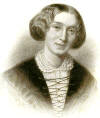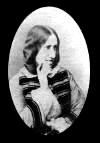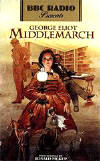
It Happened
in History!
(Go to
It Happened in History Archives)
|
Born in Warwickshire, England, on November 22, 1819,
Eliot soon
grew to become her father's favorite child. He lavished her with
tutors, who taught her several foreign languages and exposed her to the
world's greatest literature. When she turned 22, she told her father
that she viewed Christianity as a mix of fact and fiction and that she no
longer wanted to go to church. He disavowed her, and the two stopped
speaking for several weeks. She eventually made up with him, although
she refused to change her religious beliefs. Following her
father's death, Eliot traveled to Switzerland, where she wondered how she
was going to support herself. When she returned to England, she began
editing a literary journal while writing fiction on the side. She
chose to write under the pen name of George Eliot because George was the
first name of her lover and "Eliot was a good mouth-filling,
easily-pronounced word." Eliot's first book, Adam Bede (1859), was an instant best seller. Unlike most books of the day that were filled with exaggerated characters, wild coincidences, and maudlin sentimentality, Eliot told the story of an ordinary carpenter who is betrayed by his love. Everyone praised the work. People across Europe, including Leo Tolstoy in Russia, called it a work of genius, and everyone wondered who George Eliot was. Hardly an attractive woman (she was described by writer Henry James as "Magnificently, awe-inspiringly ugly"), she was remarkably influential on literature. James went on to say that "What is remarkable, extraordinary--and the process remains inscrutable and mysterious--is that this quiet, anxious, sedentary, serious, English lady ... without adventures, without extravagance, assumption, or bravado, should have made us believe that nothing in the world was alien to her; should have produced such rich, deep, masterly pictures of the multifold life of man." Eliot's insightful psychological novels, along with those of contemporary Russian novelist Fyodor Dostoevsky, paved the way for modern character portrayals. D. H. Lawrence wrote, "It was really George Eliot who started it all. It was she who started putting action inside." Her liaison with married writer and editor George Henry Lewes arose against a background of strict Victorian Puritanism and slowed her progress toward literary fame. Eliot's first collection of tales, Scenes of Clerical Life, appeared in 1858. It was followed by Adam Bede, in which the model for the title character was Eliot's father, who was noted for his great physical strength. He was alleged to carry loads that three average men could barely handle. When several literary impostors claimed authorship of the book, the publisher revealed the author to be Westminster reviewer Mary Ann (or Maryann) Evans.
In 1880, following Lewes' death, Eliot married John Cross. George Eliot died of a kidney ailment on December 22, only seven months later. Discover George Eliot
Indulge
Yourself - Check Out Today's Best-Selling |
- HOME -



